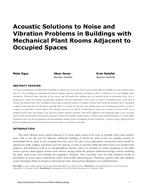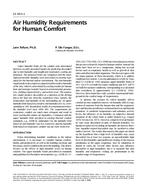Plug and process loads in medical office buildings(MOBs) have a significant impact on design of buildingsystems. This study measured plug loads at five sites,519,646 ft² (8,277 m²) of MOB buildings in the San FranciscoBay Area. The study used panel meters, circuit meters, andmetering power strips. This report compares the results toIEEE Standard design values and typical industry designvalues. In most cases, plug loads are overdesigned by 160% to260%. By room type, measured average plug load densitieswere between 0.16 W/ft² (1.76 W/m² in waiting areas and2.93 W/ft2 (31.53 W/m2) in prep and pre-op areas. By department,measured average plug load densities during occupiedhours were found to be between 0.12 W/ft² (1.29 W/m²) inprimary care and 0.74W/ft² (7.97 W/m²) in surgery/OB-GYNareas. Plug loads were found to be surprisingly high in unoccupiedhours, indicating an opportunity for savings. Bydepartment, measured average plug load densities duringunoccupied hours were found to be between 0.04 W/ft²(0.43 W/m²) in neurology and 0.49 W/ft² (5.27 W/m²) in anoncology department with a linear accelerator.
Citation: 2015 Annual Conference, Atlanta, GA, Transactions 2015, Vol 121 pt. 2
Product Details
- Published:
- 2015
- Number of Pages:
- 8
- Units of Measure:
- Dual
- File Size:
- 1 file , 1.9 MB
- Product Code(s):
- D-AT-15-005


